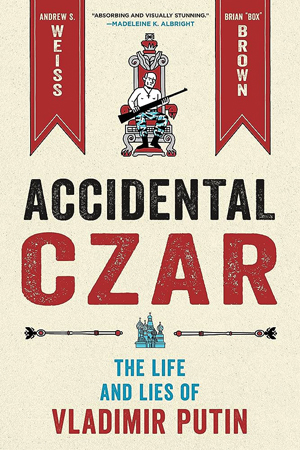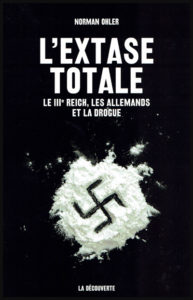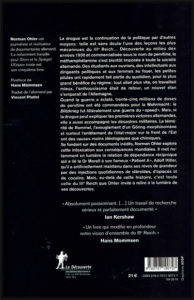
Note: The excerpts are taken from the French version of “Tsar par accident” and re-translated into English using DeepL.
Author Andrew S. Weiss has worked at the White House, the Pentagon, the State Department, and so on. He points out: “If someone had told me at the time that a former KGB non-commissioned officer – who had never really shone – a certain Vladimir Putin […] – would be promoted from the back rooms of the Kremlin directly to the head of the country, I would have told you to get yourself treated”. He adds: “What we think we know about him is often a clever mix of counter psychology and misinterpretations of Russia‘s thousand-year-old history “. His staging as a tough guy “allows him to come across as more intelligent – and more competent – than he really is. […] “.
The graphic novel “Accident Czar” tells the story of how Vladimir Putin found himself in power at a time when his rather lacklustre career was destined for a lesser position. But the same could be said of some of the world’s dictators, presidents, kings and ministers over the ages who have been blessed with good fortune. They too have taken advantage of favorable opportunities to climb the ladder too high for their natural talent. The nation then pays the price until the person’s overthrow, exile or death.
Still, we have to give Putin credit for persisting, for hanging on, despite setbacks and rejections. To join the KGB, he was told to study or join the army. He did so and received his diploma.
In 1975, he joined the KGB. But it wasn’t the big missions he had dreamed of that awaited him, but local fieldwork. He failed to impress his superiors with the results he achieved. Following a brawl in the subway, he was transferred to Dresden in 1985, where his missions were meaningless due to lack of budget. In 1999, President Clinton was told that Putin would be the next Russian president. What had happened between 1985 and 1999 for Putin to suddenly emerge from obscurity and become President of Russia?
Credit must be given to his work ethic, but above all to his loyalty to his bosses in an organization that favors personal ties. Yeltsin, the president at the time, sensed his end was coming and offered Putin a deal. The author writes: “He would make him president if he agreed to protect him and his family“.
Just as Hindenburg believed he could manipulate Hitler by giving him access to the highest echelons of government, so Yeltsin thought he could do the same with Putin. In both cases, it was a costly mistake for Europe and the world.
The book reviews the rise of the Russian oligarchs, and the rapprochement of power for Putin’s friends. Andrew Weiss points out: “One of the points that foreigners don’t always grasp is that Russia is a society that operates on the basis of personal ties, rather than within the framework of institutions or the rule of law.“
In the years following the fall of the Berlin Wall, important sectors of the Russian economy were taken over by corrupt officials and KGB agents, as well as by the mafia. As the author writes: “Vladimir Kumarin, all-powerful boss of the notorious Tambov gang, ruled the country“.
Vladimir Putin’s support for the United States after the attacks of September 11, 2001 brought him closer to George W. Bush and his father George H. W. Bush, with whom he even went fishing in Kennebunkport. He hoped to revive the moribund Russian economy and gain the freedom to control the Russian media.
What’s most astonishing to me is that, during this period, Putin approved the highly controversial establishment of American and NATO bases across the former Soviet Union (Uzbekistan,Tajikistan, Kyrgyzstan). With this gesture, he was seeking stabilization with the West. With the causes of the September 11th 2001 attacks still being debated around the world today, especially in the most informed circles, Putin was later forced to reflect on the relevance and consequences of his decision to authorize new American and NATO bases near Russia.
The Russian president quickly realizes that he doesn’t carry much weight in the diplomatic balance against a superpower like the United States. He is not recognized as a player to be reckoned with. With a view to better understanding between the West and Russia, the author stresses the importance of better understanding the grievances of both sides. He points out that this is sorely lacking.
Especially since the Kremlin is convinced that “demands for political change are always the result of Western-backed conspiracies“. All the major nations, by dint of monitoring each other and trying to influence the internal management of other countries, are projecting their intentions and no longer believe that a protest can come from the bottom up, based on a serious desire to improve certain detestable policies.
The author takes a look back at the problems surrounding Russia’s territorial security through the ages, invaded in turn by the Mongols, Napoleon and Hitler: “[Russia] traditionally relies on annexed territories to act as a buffer between the motherland and any external threat“. He also discusses the Chechen conflict, the fight against terrorism, political interference in neighboring states and Russian involvement in the 2016 US elections.
Andrew S. Weiss covers a lot of ground, and other themes find their way into the book: the history of the Cold War, Trump, Snowden, Wikileaks, the Sochi Olympics and the work of Maria Butina, a Russian agent who managed to penetrate the upper circles of the American Republican Party.
It was his belief in the irreversible decline of the West that enabled Vladimir Putin to invade Ukraine.
The author concludes with a remark on the invasion of that country and the indiscriminate bombing of civilian targets: “The world is beginning to understand that Putin was never the strategist he claimed to be. He is an improviser caught in his own trap”.
Allow me to make a comment about the invasion of Ukraine. This country is to receive fighter planes from the Allied States to protect its territory, which deeply offends Russia. However, I would like to remind you that during the Second World War, the Soviet Union accepted a great deal of outside help for its defense on the Eastern Front. To name just one aircraft and country, the Soviet Union obtained 877 B-25 Mitchell bombers from the USA.
Click on the link for more graphic novels and comics on my blog.
Title: Accidental Czar: The life and lies of Vladimir Putin.
Author: Andrew S. Weiss. Illustrator: Brian « Box » Brown
Edition: Macmillan Publishers
ISBN: 9781250760753
© 2022

